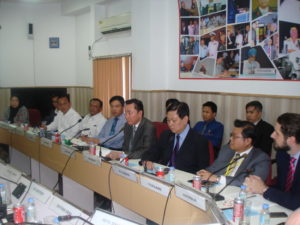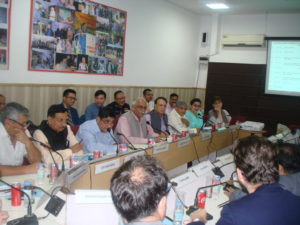The United Service Institution of India (USI), in association with the Embassy of Vietnam, New Delhi, held a Roundtable Discussion on 07 August 2019 on the theme “Evolving Security Dynamics in the Indo-Pacific: Roadmap for a Collaborative Strategic Response”. The participants included HE the Ambassador of Vietnam, HE the Ambassador of Myanmar, diplomats from the Embassies / High Commission of Australia, Brunei, EU, Indonesia, Malaysia, Myanmar, Philippines, Singapore, Thailand, USA and Vietnam.
The USI team was led by Lt Gen PK Singh, Director, USI and included Ambassador Sanjay Singh, Vice Admiral Satish Soni, Maj Gen BK Sharma, Lt Gen GS Katoch, Maj Gen R Narayanan, Maj Gen RPS Bhadauria, Maj Gen AK Das, Brig Narender Kumar, Cdr S Sarangi and Dr Roshan Khanijo amongst others. Prof Carol Burke, US Fulbright-Nehru Scholar and presently at the USI also participated.

The Opening Remarks by the Co-Chairs and Moderators which set the tone for the discussions highlighted the following:-
-
At the recently concluded 34th ASEAN Summit, ASEAN released a document titled “ASEAN Outlook on the Indo-Pacific (AOIP)”, thus recognising the evolving dynamics of the Indo-Pacific.
-
While there is a general recognition and acceptance of the core principles of sovereignty, regional order anchored in international law, freedom of navigation, cooperation and peaceful resolution of disputes etc., the reality is that some countries in the region show a lack of respect for international law and defiance of rule of law.
-
There is a growing level of strategic rivalry between major powers in the region and this coupled with the crisis/tensions in Hong Kong, the Cross-Strait tensions, North Korea, South China Sea, East China Sea and other non-traditional challenges do not augur well for the Indo-Pacific region.
-
Economic slowdown that could even lead to a recession needs serious consideration.
-
While a peaceful, stable, secure and cooperative environment is a pre-requisite for economic growth and development, China’s strategy of creating a confrontation for which no reason exists and thereafter changing the status quo needs to be addressed.
During the discussion that followed all participants expressed their views in a free, frank, forthright and cordial manner. The aim clearly appeared to be to flag the existing ground realities and find a road-map for a collaborative strategic response.
The key take-aways were:-
-
China’s rise was neither peaceful nor are its actions of creating artificial islands and militarizing them conducive to peace. China’s reneging on its promises has been noted by all countries and does not contribute to enhancing mutual trust.
-
The latest stand-off by China’s aggressive actions against Vietnam for giving permission to a Japanese oil rig contracted by the Russian-Vietnamese venture, to explore oil-rich Vanguard Bank, which lies within Vietnam’s EEZ was flagged and the issue of China unilaterally declaring the “Nine-dash line” with its attendant claims was also discussed.
-
By attempting to block economic activities in the South China Sea through coercive means, China prevents ASEAN members from accessing to trillions of dollars’ worth of maritime resources. The smaller nations by themselves will not be able to counter Chinese actions.
-
While FONOPS demonstrate the right to freedom of navigation, these by themselves are unlikely to change China’s behaviour. Hence there is a need to discuss evolving scenarios and likely responses.
-
ASEAN’s solidarity and unity is most important and it should not be held hostage to happenings in the South China Sea.
-
No party should resort to use of force and all disputes should be resolved peacefully through dialogue failing which arbitration proceedings could be resorted to under existing international laws.
-
ASEAN/concerned countries within it could establish links with the extant institutions/structures, like the Western Pacific Naval Symposium, Indian Ocean Naval Symposium, Indian Ocean Rim Association and the International Fusion Centres in Singapore, India and Madagascar.
-
The ASEAN participants also expressed a desire for India to play a more active role in the Indo-Pacific commensurate with its rising power and aspirations.

The Discussions ended with all participants thanking the USI for this initiative and hoped that this would be a regular feature of interacting with the ASEAN countries and all other countries who wish to play a constructive and cooperative role in the region. The Director, USI, thanked all participants for their active participation and support and looked forward to hosting the next Roundtable Discussion on a subject of mutual interest in the coming months.

